Description
The current issue of the Journal of Health Psychology has fourteen research articles that deal with variety of psychosocial issues relating to health and illness. The first article by Sushama Bhosale and Alena Slezackova explored the relationship between life style patterns and depression among working women of various organizations. Nilesh Thakre and Kavya Prasad investigated the work-life balance, organizational role stress and satisfaction with life amongst print and non-print media professionals. The results indicated lower organizational role stress and higher work-life balance in print media professionals than non-print media professionals. To enhance work-life balance of employees, authors have suggested strategies like arranging flexible working hours and introducing compressed work week and family leave policies.
The next article enlisted focuses on how climate change perception and adjustment will predict academic achievement. The following study enlisted in this issued by Poonam Devi, NovRattan Sharma and Deepti Hooda attempts to study the relationship between subjective vitality and hope among adolescents. Correlational analysis showed positive correlation between subjective vitality and hope. Subjective vitality was found to be positively and significantly associated with hope, indicating that individuals full of positive energy are also hopeful in their life. Individuals with high subjective vitality make their own pathways and find different agency to follow these pathways to achieve their goal. The results of the study showed non-significant gender differences on subjective vitality but significant gender differences on hope. Devina Sharma and Uma Joshi studied difference in subjective well-being among public and private sector bank employees. They reported that SWB of public sector banks employees was better than the employees of private sector banks.
The next article by Punam Devi Bagi aimed to assess the effect of yoga practice on wellbeing. Shilpa Kamboj, Anjali Malik and Sarvdeep Kohli assessed Mental Health of patients with Chronic Kidney Disease (CKD), sixty patients not yet requiring dialysis and sixty patients on maintenance hemodialysis. The results report that patients on maintenance hemodialysis had higher anxiety, higher depression, greater loss of behavioral/emotional control, poor general positive affect, more psychological distress and poor global mental health score than patients not yet requiring dialysis. Thereby, emphasizing the need for development of adequate psycho-education for improving the mental health of CKD patients.
Shivalika Sharma and Gayatri Raina compared male and female bureaucrats in terms of subjective well-being, life satisfaction and coping behavior (problem focused coping, emotion focused coping and avoidance coping). The authors found that female bureaucrats scored significantly higher on subjective well-being and life satisfaction as compared to their counterparts. Furthermore, male bureaucrats significantly scored higher on avoidance coping as compared to female bureaucrats. Annu, Deepti Hooda and NovRattan Sharma in their article examined the relationship between Emotional Intelligence and Resilience. The results point out that three dimensions of Emotional Intelligence i.e., Motivation, Self Awareness and Social Skills significantly and positively predict Resilience. The findings of the present study highlights the need for focusing on emotional intelligence while designing and developing intervention programs in order to enhance resilience.
Hardeep Lal Joshi and Gaurav Arya in their paper explored the impact of yoga practice on quality of life, frustration tolerance, health related problems, and cognitive functions among normal healthy adolescents. The result reported that yoga practicing group had better quality of life, high frustration tolerance, better memory and low physical and mental health problems as compared to non-yoga group. The 12th article in this issue examined the relationship between parental styles and measures of self-efficacy among adolescents. The author, Mandeep Sharma reported that parenting practices have a significant impact in self-efficacy among the students. The 13th paper of Touseef Rizvi and S. Reshma Jamal examines traumatic stress among Kashmiri people. The changing society’s attitude towards environment by changing society’s culture is reviewed by Sunita Rani, and Babita Saroha in the last paper.
All the articles enlisted in this issue are empirical and will provide direction for young researchers. Editors express gratitude to all the contributors for their research contributions. Editors are also grateful to the referees and members of editorial board for their valuable inputs. The members of the editorial board are of the view that the journal tries to sensitize the readers to various health related psychosocial issues that would pave the path towards a healthy community.
Contents
| Editorial | (iii) | |
| 1 | Depression and Life Style of Working Women Across Various Organizations | 1 |
| Sushama Bhosale and Alena Slezackova | ||
| 2 | Organizational Role Stress, Satisfaction with Life and Work-life Balance Among Print and Non-print Media Professionals | 9 |
| Nilesh Thakre and Kavya Prasad | ||
| 3 | Climate Change Perception and Adjustment as the Predictors of Academic Achievement | 25 |
| Balbinder Sing, O.P. Sharma, Himalaya Tiwari and Neha Singh | ||
| 4 | Subjective Vitality in Relation to Hope Among Adolescents | 37 |
| Poonam Devi, NovRattan Sharma and Deepti Hooda | ||
| 5 | Comparative Assessment of Subjective Well-being Amongst Public and Private Sector Bank Employees | 47 |
| Devina Sharma and Uma Joshi | ||
| 6 | Effect of Yoga Practices on Wellbeing | 55 |
| Punam Devi Bagi | ||
| 7 | Mental Health of Patients with Chronic Kidney Disease | 61 |
| Shilpa Kamboj, Anjali Malik and Sarvdeep Kohli | ||
| 8 | Subjective Well-Being, Life Satisfaction and Coping Behavior Among Male and Female Bureaucrats | 71 |
| Shivalika Sharma and Gayatri Raina | ||
| 9 | Emotional Intelligence as a Predictor of Resilience | 81 |
| Annu Deepti Hooda and NovRattan Sharma | ||
| 10 | Different Parenting Styles Amidst this Era of Internet Technology | 89 |
| Ms Bijoyeta Das | ||
| 11 | Quality of Life, Frustration Tolerance, Health Problems and Memory among Non-Yoga and Yoga Practicing Adolescents | 97 |
| Dr. Hardeep Lal Joshi and Gaurav Arya | ||
| 12 | Parenting Styles and Self-efficacy among Adolescents | 107 |
| Mandeep Sharma | ||
| 13 | Traumatic Stress Among Kashmiri People | 119 |
| Touseef Rizvi and S. Reshma Jamal | ||
| 14 | Changing Society’s Attitude Towards Environment by Changing Society’s Culture | 127 |
| Dr. Sunita Rani, and Babita Saroha |
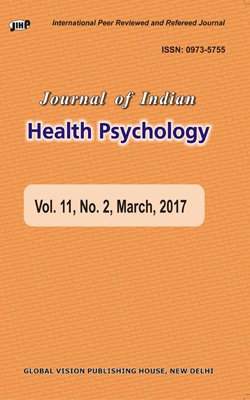
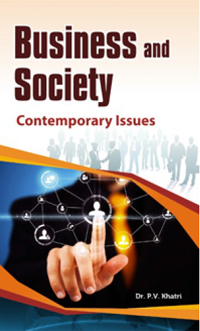


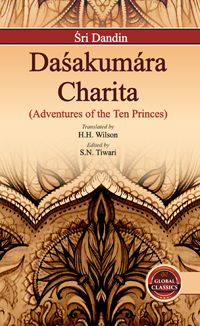


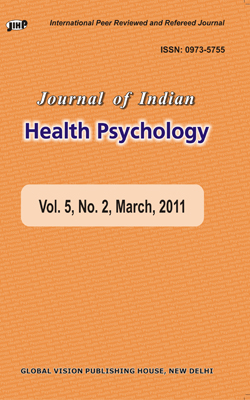
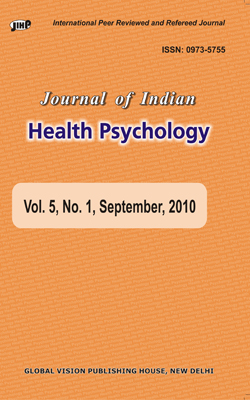
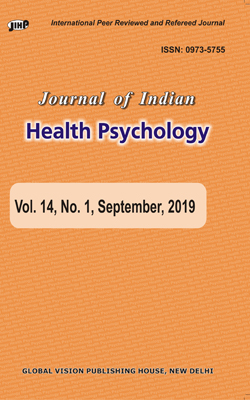
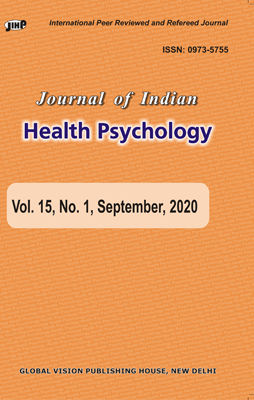
Reviews
There are no reviews yet.